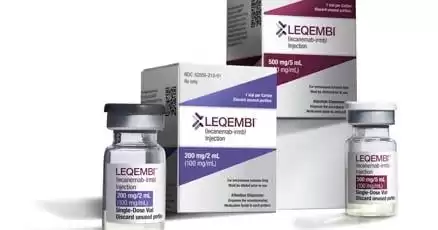Medicare to Cover Alzheimer's Drug Leqembi Following Full FDA Approval
US officials approve Alzheimer's drug Leqembi, allowing insurance coverage.
The United States government has granted full approval for a highly anticipated Alzheimer's drug, called Leqembi, marking a significant milestone in the treatment of the brain disease. This approval means that Medicare and other insurance plans can now cover the cost of the treatment for individuals suffering from the debilitating effects of Alzheimer's.
The Food and Drug Administration (FDA) has endorsed Leqembi, an intravenous drug, for patients experiencing mild dementia and other symptoms associated with early-stage Alzheimer's disease. This medication is the first of its kind to demonstrate a modest slowing of cognitive decline in individuals with Alzheimer's.
Japanese pharmaceutical company Eisai initially received conditional approval from the FDA in January based on early findings that suggested Leqembi effectively cleared the sticky brain plaque associated with Alzheimer's. The FDA further validated these results by reviewing data from a larger study involving 1,800 patients. The study revealed that the drug slowed memory and cognitive decline by approximately five months in those who received the treatment compared to those who received a placebo.
FDA's neurology drug director, Teresa Buracchio, stated, "This confirmatory study verified that it is a safe and effective treatment for patients with Alzheimer's disease."
However, it is important to note that the drug comes with potential side effects, including brain swelling and bleeding. While these side effects are rare, the drug's prescribing information will include a warning to ensure patients are aware of these risks. Similar side effects have been observed with other plaque-targeting Alzheimer's drugs.
The process of obtaining full FDA approval for a drug typically garners little attention. However, in the case of Leqembi, Alzheimer's patients and advocates have been actively lobbying the government for months. This is because Medicare officials previously announced that they would not cover the cost of routine Leqembi use until the drug received full FDA approval.
The concern was primarily related to the financial implications of covering new plaque-targeting Alzheimer's drugs like Leqembi, as Medicare provides healthcare for approximately 60 million seniors. Leqembi is priced at around $26,500 for a year's supply of intravenous treatments every two weeks.
The majority of Americans with Alzheimer's rely on Medicare for their healthcare coverage. Consequently, private insurers have followed Medicare's lead and refrained from covering Leqembi, as well as a similar drug called Aduhelm, until they receive full FDA endorsement. However, it is important to note that the FDA's decision on full approval for Aduhelm is still years away.
Chiquita Brooks-LaSure, the administrator of Medicare, has made it clear that the program will now start covering the cost of Leqembi following its full FDA approval. However, the government is implementing additional requirements. Medicare recipients receiving Leqembi must be enrolled in a federal registry to monitor the drug's real-world safety and effectiveness. This information will contribute to advancing knowledge about the potential benefits of these drugs.
Hospitals and medical clinics have also cautioned that it may take some time to initiate patients on the drug. Before prescribing Leqembi, doctors need to confirm that patients have the specific brain plaque targeted by the drug. Additionally, nurses need to be trained to administer the medication, and patients must undergo repeated brain scans to monitor for any potential swelling or bleeding. These imaging and administration services come with additional costs for hospitals beyond the cost of the drug itself.
Eisai has projected that approximately 100,000 Americans could be diagnosed with Alzheimer's and become eligible for Leqembi by 2026. The drug is co-marketed with Biogen, a company based in Cambridge, Massachusetts.
Alexander Scott, a vice president with Eisai, emphasized the importance of ensuring that only appropriate patients receive the drug. This highlights the need for careful evaluation and monitoring throughout the treatment process.
Eisai conducted studies on Leqembi involving individuals with early or mild Alzheimer's disease. These participants were assessed using a scale that measures memory, thinking, and other basic skills. After 18 months, those who received Leqembi experienced a slower decline, with less than half a point difference on the scale compared to participants who received a placebo infusion. Some Alzheimer's experts argue that this delay may be too subtle for patients or their families to notice.
However, federal health advisers believe that even this slight difference could be meaningful. They recommended the FDA's full approval of the drug during a public meeting in June.
The Associated Press Health and Science Department receives support from the Howard Hughes Medical Institute's Science and Educational Media Group. It is important to note that the AP is solely responsible for all content.
For more information, please visit The Gazette's website.












Comments on Medicare to Cover Alzheimer's Drug Leqembi Following Full FDA Approval